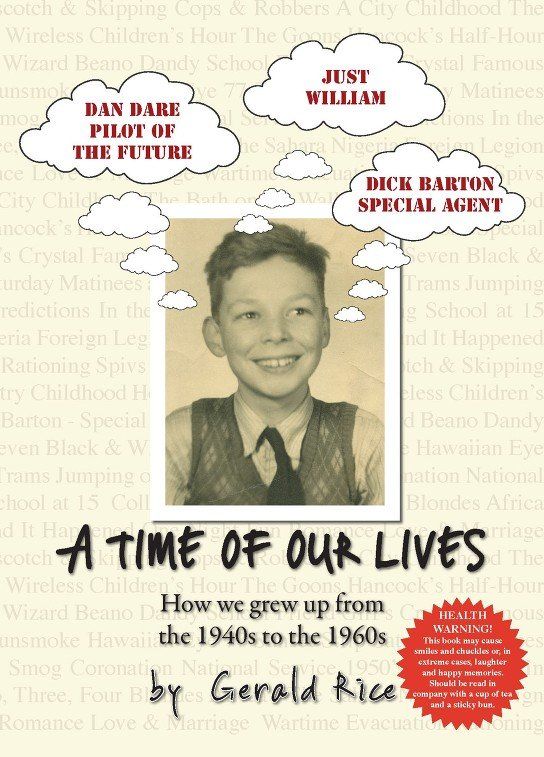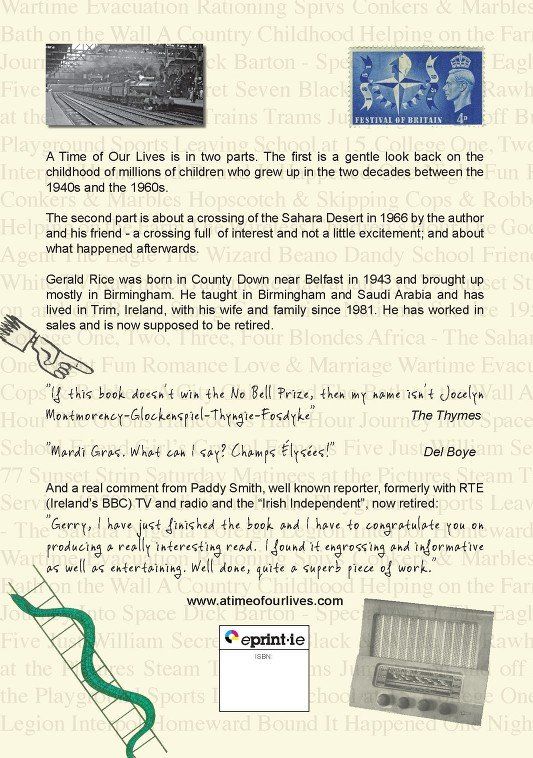A Time of Our Lives- How we grew up from the 1940s to the 1960s
A Book for the Young Folk (those born anytime after 1965)
A Book for the Young Folk (those born anytime after 1965)
I have often regretted that I did not ask my parents and grandparents what their lives were like when they were growing up
and now much of what they knew and took for granted has been lost. My father and mother were both born almost 100 years before this book was written – my mother's father 136 years before. My father's father, born in 1891, worked in a linen mill as a “rougher” in 1911 and his thirteen year old sister worked in the same mill as a “doffer”. Neither of these jobs exist any more in this country and, while I might guess what a rougher did, I had no idea what a doffer's duties were until I searched on Google and discovered that she cleared heavy full bobbins from a spinning frame and replaced them with empty ones so that the machinery could continue spinning the linen yarn. How many similar changes have taken place since my grandparents were children that we no longer even know about?
This book is an attempt to preserve for my children and grandchildren, and anyone else who might be interested, something of what it was like to grow up between the 1940s and 1960s (although there are some, perhaps many, who would say that I never grew up). I hope to show with examples from my own and others’ experiences, how people, especially young people, lived in the period from the 1940’s to the 1960’s - or the “olden times” that my children sometimes asked about when they were very young - and so bring to mind some of the happenings, sights, sounds and even smells of those days which were, in some ways, a golden time in which to be growing up in but an often difficult one for those already grown up.
The book is also intended to be a walk through the meandering lanes of memories of my younger days when nine or ten year olds could go off on their own, or with one or two friends, for hours at a time and no one would be worried about what had happened to them or concerned that they might have fallen into some danger. Few “Health and Safety” regulations existed but instead, common sense usually prevailed. This was a time when children played in the street without danger from the few cars around, when they listened to Childrens Hour at five o'clock on the radio, or "wireless", as we called it, since the sounds came magically through the air and
This book is an attempt to preserve for my children and grandchildren, and anyone else who might be interested, something of what it was like to grow up between the 1940s and 1960s (although there are some, perhaps many, who would say that I never grew up). I hope to show with examples from my own and others’ experiences, how people, especially young people, lived in the period from the 1940’s to the 1960’s - or the “olden times” that my children sometimes asked about when they were very young - and so bring to mind some of the happenings, sights, sounds and even smells of those days which were, in some ways, a golden time in which to be growing up in but an often difficult one for those already grown up.
The book is also intended to be a walk through the meandering lanes of memories of my younger days when nine or ten year olds could go off on their own, or with one or two friends, for hours at a time and no one would be worried about what had happened to them or concerned that they might have fallen into some danger. Few “Health and Safety” regulations existed but instead, common sense usually prevailed. This was a time when children played in the street without danger from the few cars around, when they listened to Childrens Hour at five o'clock on the radio, or "wireless", as we called it, since the sounds came magically through the air and
"Engrossing, informative and entertaining"
"Enchanting"
"The best book I have read in a long time"
not along wires like the sounds on a telephone. Apart from the very few people who had television at home, we could only crowd round the windows of radio shops to watch the flickering black and white pictures of Muffin the Mule and of the Coronation in 1953 on small screen television sets.
It was a time when children enjoyed simple pleasures, not that much different from their parents and grandparents. If we wanted to meet friends, we went round to their houses to see if they were in. We couldn’t call on a mobile phone, or even an ordinary landline phone because very few people where we lived had such a thing in the house. We couldn't Google for information because there were no computers or internet - we had to look things up in books and encyclopedias. We certainly weren’t connected electronically 24/7. We couldn’t text or tweet, so all contacts with our friends were face to face.
We found enjoyment in skipping stones across a pond, in not stepping on the cracks in the pavement, in building up pictures in our minds while listening to the wireless and, certainly in my case, in reading. Perhaps we benefited from using our own imaginations to amuse ourselves, rather than relying on a constant barrage of images from a screen. The world of my childhood was certainly slower and simpler than now but I think this meant that we had more time just to be children. It was a time when we were satisfied with having less because there was less to have.
This book is not intended as an autobiography, although, obviously, a considerable number of events of my life are included and the second part of the book tells of an overland trip I made with a friend in a Land Rover across the Sahara Desert in 1966. We made it across the Sahara, the Land Rover didn't. Apart from this, most episodes in the book, or similar ones, would have been part of the experience of growing up for many hundreds of thousands, indeed millions, of boys and girls around my age during the years about which I am writing.
The book is largely in chronological order but not rigidly so, as I remember aspects of growing up in connection with different topics covered, hence the “meandering lanes of memories” mentioned above
It was a time when children enjoyed simple pleasures, not that much different from their parents and grandparents. If we wanted to meet friends, we went round to their houses to see if they were in. We couldn’t call on a mobile phone, or even an ordinary landline phone because very few people where we lived had such a thing in the house. We couldn't Google for information because there were no computers or internet - we had to look things up in books and encyclopedias. We certainly weren’t connected electronically 24/7. We couldn’t text or tweet, so all contacts with our friends were face to face.
We found enjoyment in skipping stones across a pond, in not stepping on the cracks in the pavement, in building up pictures in our minds while listening to the wireless and, certainly in my case, in reading. Perhaps we benefited from using our own imaginations to amuse ourselves, rather than relying on a constant barrage of images from a screen. The world of my childhood was certainly slower and simpler than now but I think this meant that we had more time just to be children. It was a time when we were satisfied with having less because there was less to have.
This book is not intended as an autobiography, although, obviously, a considerable number of events of my life are included and the second part of the book tells of an overland trip I made with a friend in a Land Rover across the Sahara Desert in 1966. We made it across the Sahara, the Land Rover didn't. Apart from this, most episodes in the book, or similar ones, would have been part of the experience of growing up for many hundreds of thousands, indeed millions, of boys and girls around my age during the years about which I am writing.
The book is largely in chronological order but not rigidly so, as I remember aspects of growing up in connection with different topics covered, hence the “meandering lanes of memories” mentioned above




